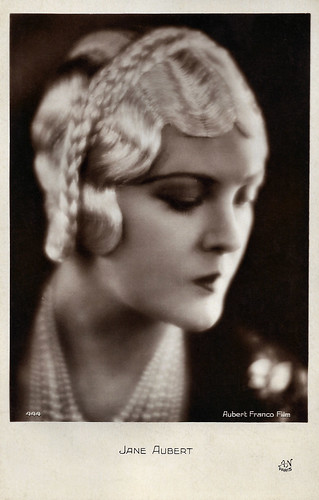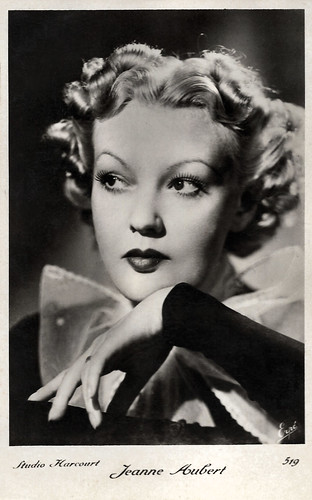
French postcard by A.N. (A. Noyer), Paris, no. 444. Photo: Aubert Franco Film. Jane Aubert in La Possession/The ownership (Léonce Perret, 1929).

French postcard by Editions O.P., Paris, no. 960. Photo: Teddy Piaz.

French postcard by Erpé, no. 519. Photo: Studio Harcourt.
The moral of this story is, never marry an actress
Jeanne Aubert was born Jeanne Perrinot in 1900 in Paris, France, to a single mother, Augustine Marguerite Perrinot. According to IMDb, her father was a French aristocrat.
Preceding her birth, four generations of Aubert's had made and sold artificial flowers, but Augustine pushed her daughter into a career in show business. At age five, she began performing on stage at the Théâtre du Châtelet. As a teenager, she studied voice and music.
At age eighteen, Jeanne appeared in an elaborate Mistinguett revue at the Casino de Paris. She sang in the chorus at the Apollo theater in Paris and had bit parts in revues at the Théâtre Édouard VII.
She gained prominence when, as an understudy, she replaced the lead actress in 'Le Bon Juge' (the good judge). The song 'Si tu vois ma tante' (If you see my aunt) made her a "grande Chanteuse" in Paris.
After that, she was signed for a featured role in a production in London and went on to perform in Belgium, Italy, and Switzerland. In 1926, she went to the United States to perform in 'Gay Paree' at the Winter Garden Theatre. After 175 performances, she returned to Paris to appear at the Moulin-Rouge in the revue 'Paris aux Étoiles' in 1927.
In 1928, she helped to organise the first female branch of the Jeunesse Ouvrière Chrétienne (JOC), a Roman Catholic apostolic organisation for young people. Aubert served as the first president of the JOCF of France.
Using the stage name Jane Aubert, she appeared in the silent film, La Possession/The ownership (Léonce Perret, 1929) starring Francesca Bertini and Pierre de Guingand. Wikipedia calls it her film debut, but actually, Aubert's first film was Être aimé pour soi même/To be loved for oneself (Robert Péguy, 1920).
La Possession was seen (reportedly 52 times) by Nelson Swift Morris, son of a Chicago multi-millionaire. His family had made their fortune in corned beef and at the time, Morris was overseeing a meatpacking operation in France. He used his connections to get to meet Aubert and the two became involved.
Eventually, they moved to the United States and married. Morris opposed Aubert's acting so much that he got out warrants forbidding her to appear in European shows. Obviously, the marriage failed and they were divorced in 1933. Morris, who also survived the Hindenburg disaster in 1937, later commented: "The moral of this story is, never marry an actress."

French postcard, no. 590. Photo: ACE.

French postcard, no. 590.
Madame Aubert never lost her elegance, charisma, and shine
In 1931, Jeanne Aubert was a guest star on a radio broadcast on WJZ, singing selections from the show 'America's Sweetheart' in which she appeared on Broadway. Her other Broadway credits included 'Princess Charming' (1930), 'The Laugh Parade' (1931), 'Ballyhoo of 1932' (1932) with Bob Hope, and 'Melody' (1933) with Gypsy Rose Lee.
Following her divorce, Aubert began working in Broadway musical comedies and appeared in the short films The Mysterious Kiss (Roy Mack, 1934) and The Gem of the Ocean (Roy Mack, 1934).
In 1935, she returned to France where she acted in several films during the ensuing two years. These included Les époux scandaleux/The scandalous spouses (Georges Lacombe, 1935) with Suzy Vernon and René Lefèvre, Passé à vendre/Past for sale (René Pujol, 1936) with Pierre Brasseur, and La souris bleue/The blue mouse (Pierre-Jean Ducis, 1936) with Henri Garat.
In 1937, she returned to the stage, performing in musical varieties with the celebrated songstress Fréhel at the ABC Theatre in Paris. She was part of a number of other shows in London and other cities throughout Europe including the original London production of the musical 'Anything Goes' by Cole Porter, in which she played the lead role of Reno Sweeney.
During WWII, she appeared 630 times in 'La Veuve joyeuse' (The Merry Widow) at the Mogador Theatre and also in two other theatres. Although never a headline star, for the next decades her career was busy with numerous recordings, film and stage performances, and eventually roles on television.
Her later film include the comedy Les croulants se portent bien/The crumblers are doing well (Jean Boyer, 1961) starring Fernand Gravey, the drama Les ennemis/A Touch of Treason (Edouard Molinaro, 1962) as the mother of Roger Hanin, and her last film, Un monde nouveau/A New World (Vittorio De Sica, 1966) with Nino Castelnuovo.
In 1965, she returned to the stage in Arthur Miller's 'Après la chute' (After the Fall), directed by Luchino Visconti at the Théâtre du Gymnase.
Rudi Polt at IMDb: "Madame Aubert never lost her elegance, charisma, and shine." Later in life, she was the companion of Olympe-Charles Hériot whose family created and owned the Paris department store Les Grands Magazins du Louvre.
Jeanne Aubert passed away in 1988, aged 88, in a retirement home in Coubert, Seine-et-Marne, France, and was interred in the Cimetière Parisien de Pantin in Pantin.

French postcard by S.E.R.P., no. 34. Photo: Studio Harcourt.

French postcard by EPC (Editions et Publications Cinématographiques), no. 167. Photo: Star.
Sources: Rudi Polt (IMDb), Du Temps des Cerises aux Feuilles mortes (French), Wikipedia, and IMDb.
No comments:
Post a Comment